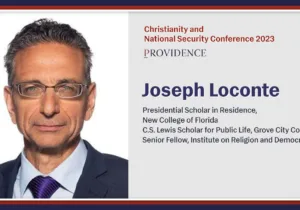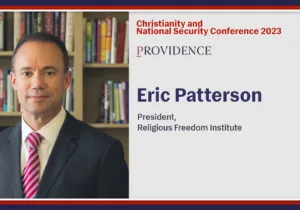As a young boy in early 1970s I first saw the 1942 Oscar winning WWII morale boosting film Mrs. Miniver and was unforgettably inspired. I rewatch it every decade or so, including last week, and it’s no less stirring. FDR and Churchill praised it while Goebbels reputedly feared its influence. Its uplifting conclusion is a Church of England sermon explaining the war’s necessity.
The Minivers are a plucky English family surviving the first two years of war with Germany. Mrs. Miniver finds a downed German pilot in her garden, eventually disarming him and politely calling both police and a doctor for the wounded airman, despite his hissing threat to overrun her country. Mr. Miniver is an affable architect who serves in the Home Guard. In the middle of the night he and other village boat owners are ordered to the coast to rescue beleaguered British forces at Dunkirk. Their son joins the Royal Air Force, his plane roaring over their house as he meets the incoming Luftwaffe. Their two small children uncomplainingly suffer through air raids in the backyard family bomb shelter. Mother and father patiently read aloud from Alice in Wonderland as their beautiful home is smashed above by a German bomb.
English resolve is further evinced at the village pub, where threatening German radio broadcasts are received with mocking disdain, even after France has fallen. But the chief center of resistance is the village church, whose stately rector seems to be the most respected community leader among all classes. The Minivers are at church when the rector announces Britain is at war and promises Britons will defend their homeland with no less ardor than their knightly ancestors whose martial sarcophagi line the sanctuary.
“The prayer for peace still lives in our hearts…coupled now with the prayer for our beloved country,” the vicar proclaims from the pulpit. “We in this village have not failed in the past. Our forefathers, for 1,000 years, have fought for the freedom that we now enjoy, and that we must now defend again. With God’s help, and their example, we cannot fail.” The Minivers in the front pew listen closely.
When Mr. Miniver and his neighbors later steer their small boats down inky rivers at night not yet knowing their destination, they pass a series of ancient church spires illumined by moonlight. These ghostly churches are spiritual beacons to the boatmen, lest they lack motivation for defending their country. As a flotilla of hundreds assemble near the coast, they are finally informed of their dangerous cross channel mission to Dunkirk. As civilians they are under no obligation to proceed into the war zone, the Royal Navy alerts them, and anyone may turn back. Of course not a man does. Mrs. Miniver doesn’t see or hear from her husband for five days, prompting a neighbor reassuringly to quote Psalm 107:
Them that goes down to the sea in ships and has their business in the great waters, these men see the works of the Lord and His wonders in the great deep.
The neighbor tells Mrs. Miniver: “You can’t beat the Bible, can you, when it comes to deep feelings? No, and no one has thrown that over for a set of Goebbels and Goering.”
Mr. Miniver, having seen the works of the Lord in the Dunkirk Miracle, returns home to his wife and collapsed exhausted into his bed. Their RAF pilot son marries the granddaughter of the aristocratic Lady Beldon, village matriarch, whose family has occupied their pew at the village church for centuries. She’s a benevolent snob whose class consciousness does not override her wider Christian conscience. She declines her cherished award at the annual flower show so that the humble train station master can be honored for his own garden rose. During an air raid she hospitably invites the assembled villagers into the cellar of her grand estate house.
Mrs. Miniver during that air raid drives her son and his new bride to the nearby air base so he can join his squad against the incoming German attack. Mother and daughter-in-law inch the car home at night with no lights as Luftwaffe and RAF battle overhead. Planes crash land around them, leaving no doubt that their bucolic village is the frontline in this war. Stray bullets strafe the car, hitting and ultimately killing the daughter-in-law, leaving two families in grief.
The following Sunday much of the village is in church, whose roof is gone thanks to Nazi bombs. The congregation, including the Minivers and Lady Beldon, sing “Onward Christian Soldiers.” And the rector defiantly preaches from a makeshift pulpit about the purpose of their wartime suffering:
This is not only a war of soldiers in uniform. It is the war of the people, of all the people. And it must be fought not only on the battlefield, but in the cities and in the villages, in the factories and on the farms, in the home and in the heart of every man, woman, and child who loves freedom. Well, we have buried our dead, but we shall not forget them. Instead, they will inspire us with an unbreakable determination to free ourselves, and those who come after us, from the tyranny and terror that threaten to strike us down. This is the People’s War. It is our war. We are the fighters. Fight it, then! Fight it with all that is in us! And may God defend the right.
Overhead, seen through the missing church roof, RAF planes in V formation surge forward set to a soaring musical score of Pomp and Circumstance. FDR reputedly has the rector‘s sermon translated into several languages and leafletted over occupied Europe.
The sermon merited FDR’s favor, and the whole film is suffused with the church’s influence not just in bolstering wartime morale but in cohering society and animating it with moral purpose. There are class divisions, but the church bisects them and points to the common good, supported by courage, patience, perseverance, self-denial.
In church just before war is announced the congregation sings Children of the Heavenly King, whose opening stanzas are:
Children of the heavenly King,
As ye journey, sweetly sing;
Sing Savior’s worthy praise,
Glorious in His works and ways
We are traveling home to God,
In the way the fathers trod;
They are happy now, and we
Soon their happiness shall see.
Death is no deterrent to courageous living because earthly struggles are only preamble to eternal life. Not everyone in the village is in the church. The crowd at the pub mostly is not. Yet the church, with its limited congregation, still inspires and morally leads society.
The Church of England has had a special place in British society, and Mrs. Miniver is of course a wartime idealization. Yet its role, however fictionally romanticized, illustrates the church’s vocation everywhere in every culture for social solidarity. At its best, the church cares for, serves, unifies and morally leads society, reminding all of their duties to each other. The church, if faithful, coheres communities and nations, calling them to higher spiritual purposes beyond narrow self interest.
And as Mrs. Miniver’s rector assured his congregation, in a message of hope and warning for every society, God will defend the right.







 Sponsor a student for Christianity & National Security 2024
Sponsor a student for Christianity & National Security 2024